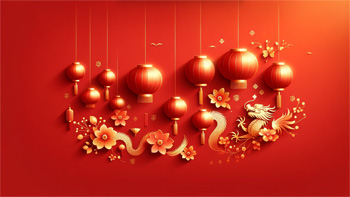 Chinese New Year: Celebrating the Spring Festival
Chinese New Year: Celebrating the Spring Festival


Chinese New Year, also known as Spring Festival, is not only a pivotal holiday in China but also celebrated with immense joy and fervor across various parts of the world. This festival marks the beginning of a new year on the traditional Chinese lunar calendar and is a time for family reunions, feasting, and honoring ancestors. Its significance stretches far beyond mere celebration; it's a profound embodiment of Chinese cultural heritage and traditional values.
The festival's origins can be traced back thousands of years, deeply rooted in various myths and customs. The most popular legend associated with Chinese New Year is that of Nian, a mythical beast believed to devour crops, livestock, and even villagers. To scare away Nian, people put up red decorations and used firecrackers, a tradition that continues to this day. This historical backdrop sets the stage for understanding the rich tapestry of customs and rituals that define the festival.
Celebration Timeframe and Preparations
The festivities of Chinese New Year stretch over two weeks, starting from the New Moon on the first day of the lunar year and culminating with the Lantern Festival on the 15th day. Preparations for the celebration start well in advance, often involving thorough house cleaning to sweep away any ill-fortune and make way for incoming good luck. This practice reflects the belief in discarding the old to welcome the new.
Another key aspect of the preparations is shopping for the festival. Markets and shops are bustling with people buying decorations, food, clothes, and gifts. Red, symbolizing luck and joy, dominates the color scheme of decorations. Homes are adorned with red lanterns, couplets, and paper cuttings, all carrying auspicious meanings and wishes for prosperity.
Family Reunions and Feasting
Central to Chinese New Year is the concept of family. It's a time when family members, near and far, come together in what is considered the most significant annual family reunion. The New Year's Eve dinner, known as 'Reunion Dinner', is a lavish feast symbolizing family unity and blessing. The dishes served during this meal are not only delicious but also carry symbolic meanings. For example, fish is included to represent surplus and wealth, while dumplings shaped like ancient Chinese gold ingots symbolize prosperity.
The warmth of the festival is further amplified by the tradition of giving red envelopes or 'hongbao'. These envelopes, filled with money, are typically given by the elders to children and unmarried adults. This act is not just about gifting money; it's a transfer of blessings and good wishes from the elders to the younger generation.
Traditional Activities and Customs
Chinese New Year is marked by various traditional activities and customs that add to the vibrancy of the celebration. Dragon and lion dances are among the most spectacular, with performers dressed in elaborate costumes, bringing the mythical creatures to life in a vibrant display of skill and color. These dances are believed to bring good luck and drive away evil spirits.
Another important activity is paying visits to friends and relatives, known as 'Bai Nian'. This custom strengthens social ties and often involves the exchange of gifts and good wishes. People also visit temples to pray for good fortune and health in the coming year. The burning of incense and offering of food to deities and ancestors are common practices in these visits.
Significance of the Chinese Zodiac
Each Chinese New Year is associated with one of the 12 animals in the Chinese zodiac cycle. The zodiac animal of the year plays a significant role in the festivities and is believed to influence the fortunes of people born in that year. For example, if the year is the Year of the Ox, people born in previous Ox years are thought to face a year of change and challenge.
The zodiac animal not only adds a unique flavor to each year's celebration but also connects the festival to the agricultural roots of Chinese society. These animals, often linked to folk tales and ancient beliefs, reflect the harmonious relationship between humans, nature, and the cosmos in traditional Chinese culture.
Global Impact and Celebrations
Chinese New Year has transcended geographical boundaries and is celebrated globally, reflecting the widespread Chinese diaspora and cultural influence. Major cities around the world host parades, cultural performances, and exhibitions, showcasing the richness of Chinese traditions and fostering cultural exchange.
In these global celebrations, elements like the dragon dance, red decorations, and the lighting of lanterns have become familiar sights, even to those outside the Chinese community. This international aspect of the festival not only promotes cultural diversity but also encourages understanding and appreciation among different communities.
In essence, Chinese New Year is a festival steeped in history, culture, and tradition. It's a vivid tapestry of ancient customs, family values, and communal harmony. As the world becomes increasingly interconnected, this celebration stands as a testament to the enduring appeal and cultural richness of Chinese traditions, inviting people from all walks of life to partake in its joyous and auspicious festivities.